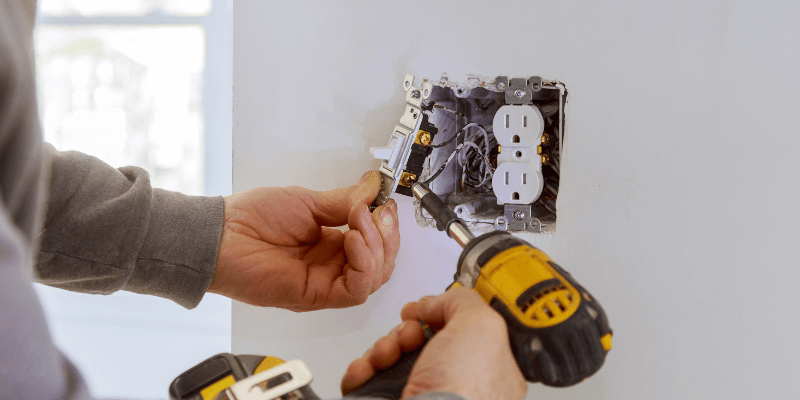How To Become an Electrician

In 2021, the average median salary for electricians in the United States was $60,040. Even on the lower end of that spectrum, the lowest 25 percent made almost $47,000. Starting your own electrical business could provide you with a steady income.
Just about everyone needs an electrician at one point or another. Electrician careers are boundless, and new opportunities are always popping up.
Keep reading to learn how to become an electrician and learn more about how to get started.
The Different Types of Electricians
First of all, it's important to know what kind of electrician you intend on becoming. There are several different directions you can go, and they each require specialized skill sets.
You can typically expect the type of role you obtain to affect availability and potential income.
Based on Education and Certifications
Electricians are often initially categorized by level of proficiency. This is decided through an electrician's experience, licensing, and certifications.
Apprentice electricians are in training. Positions are typically offered to individuals who wish to work in the field. It usually can take anywhere between two to four years to complete.
A journeyman is the basic level most electrician start at. They've completed their apprenticeship and received a license to work. As a journeyman, you can work independently but can be limited in how you can operate.
Journeymen usually become master electricians after two years of experience. It may require you to complete an exam, but requirements can vary. Master electricians can train apprentices, lead jobs, and direct teams.
Specializations
Specializations break down further into categories such as residential and commercial electricians.
Residential electricians are some of the most popular and familiar positions. They can hook up your home and electrical systems, such as lighting and air conditioning systems.
In contrast, commercial electricians can train to work in commercial office buildings with a larger electrical setup.
How to Become an Electrician
Becoming an apprentice is only one part of training to become an electrician. Most professionals will not accept you as an apprentice if you don't meet the minimum requirements. That includes basic high-school education and potentially attending a trade or vocational school.
Basic Education
One of the things you'll likely need is a high school diploma or a GED. Electricians use a wide variety of academic concepts, so it might be necessary to prove that you've learned them and can apply those concepts.
This could include algebra, physics, and English. It can also be beneficial if you take shop and mechanical drawing classes.
Trade or Vocational-Technical School
Other than education at a high school level, you could consider attending a trade school or college. It might not be required or necessary, but the knowledge you learn there can prove invaluable depending on what specialty you end up working in.
For example, you may want to study electrical power engineering technology at a university. You can get either an associate's or bachelor's degree. At the very least, it could show potential employers that you're motivated and have the knowledge for a position.
Apprenticeship
Arguably the most important part of training to become an electrician is your apprenticeship. Without a completed apprenticeship, you typically can't become an electrician, regardless of how many years you've studied at a university.
There are three main ways you can pursue one.
Trade schools usually offer placement opportunities through their network. Certain unions may offer classes and technical training that require joining them. There are also non-union electrical contractors that can offer apprenticeships.
How long it takes to complete your apprenticeship could depend on your location. Some states require a few years before you can take the exam to get licensed. In addition, some states might require you to register as an apprentice before you can work.
License or Certification
One of the final steps before you can work as an electrician is to get licensed or certified.
Some areas require a license in order to work. In that case, you might need to pass an electrical exam that tests your knowledge of the National Electric Code and other concepts.
There are also certifications you can obtain to show employers as proof of your knowledge and experience. One type of these certifications is the OSHA Safety Certificate, it can typically be obtained through a 40-hour program.
Insurance
Once you're employed, you should consider insurance for electricians. This can help you avoid legal trouble and financial damage to your business.
There's general liability, business property, and cyber insurance to consider.
General liability can protect your business in the case of third-party property damage or injury to a non-employee. Business property insurance helps to cover the costs of replacing stolen or damaged equipment.
Cyber insurance can help if you need to hire a professional in the case of a cyber-attack or loss of data. You can also obtain all three of these types of coverages in a Business Owners Policy.
Workers’ Compensation is another type of coverage to take into consideration if you have employees. It could protect your business and help take care of your employees in case of a workplace injury or occupational illness occurs.
Buy Insurance for Electricians
Now that you know some of the steps for becoming an electrician, you can get started on your career path. The apprenticeship alone could take a few years before you can pursue certification. After that, you may choose the option to become an individual contractor or join a company.
If you start your own business, you should consider getting an insurance policy via PolicySweet®. We allow small business owners to quote and find policies online or by the phone. Register online today and get a quote in just a few minutes.